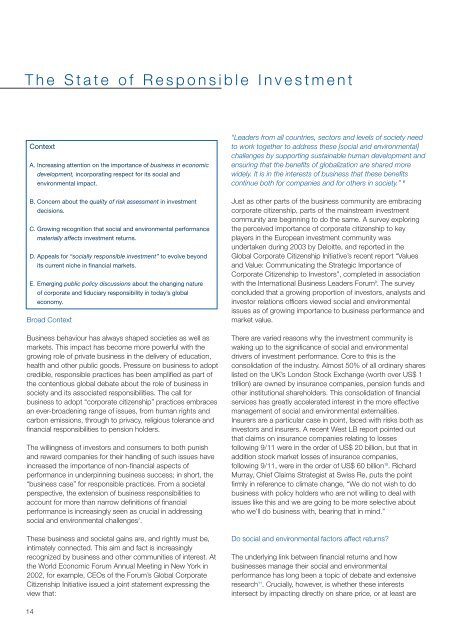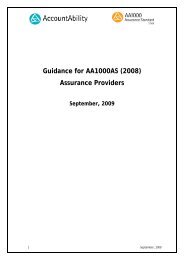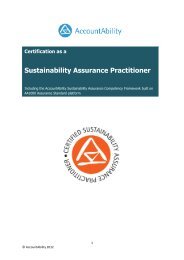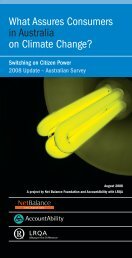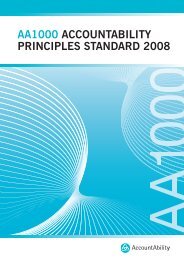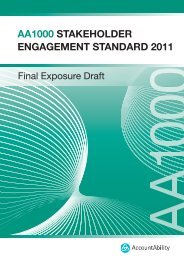Mainstreaming Responsible Investment - AccountAbility
Mainstreaming Responsible Investment - AccountAbility
Mainstreaming Responsible Investment - AccountAbility
Create successful ePaper yourself
Turn your PDF publications into a flip-book with our unique Google optimized e-Paper software.
The State of <strong>Responsible</strong> <strong>Investment</strong><br />
Context<br />
A. Increasing attention on the importance of business in economic<br />
development, incorporating respect for its social and<br />
environmental impact.<br />
B. Concern about the quality of risk assessment in investment<br />
decisions.<br />
C. Growing recognition that social and environmental performance<br />
materially affects investment returns.<br />
D. Appeals for “socially responsible investment” to evolve beyond<br />
its current niche in financial markets.<br />
E. Emerging public policy discussions about the changing nature<br />
of corporate and fiduciary responsibility in today’s global<br />
economy.<br />
Broad Context<br />
Business behaviour has always shaped societies as well as<br />
markets. This impact has become more powerful with the<br />
growing role of private business in the delivery of education,<br />
health and other public goods. Pressure on business to adopt<br />
credible, responsible practices has been amplified as part of<br />
the contentious global debate about the role of business in<br />
society and its associated responsibilities. The call for<br />
business to adopt “corporate citizenship” practices embraces<br />
an ever-broadening range of issues, from human rights and<br />
carbon emissions, through to privacy, religious tolerance and<br />
financial responsibilities to pension holders.<br />
The willingness of investors and consumers to both punish<br />
and reward companies for their handling of such issues have<br />
increased the importance of non-financial aspects of<br />
performance in underpinning business success; in short, the<br />
“business case” for responsible practices. From a societal<br />
perspective, the extension of business responsibilities to<br />
account for more than narrow definitions of financial<br />
performance is increasingly seen as crucial in addressing<br />
social and environmental challenges 7 .<br />
These business and societal gains are, and rightly must be,<br />
intimately connected. This aim and fact is increasingly<br />
recognized by business and other communities of interest. At<br />
the World Economic Forum Annual Meeting in New York in<br />
2002, for example, CEOs of the Forum’s Global Corporate<br />
Citizenship Initiative issued a joint statement expressing the<br />
view that:<br />
“Leaders from all countries, sectors and levels of society need<br />
to work together to address these [social and environmental]<br />
challenges by supporting sustainable human development and<br />
ensuring that the benefits of globalization are shared more<br />
widely. It is in the interests of business that these benefits<br />
continue both for companies and for others in society.” 8<br />
Just as other parts of the business community are embracing<br />
corporate citizenship, parts of the mainstream investment<br />
community are beginning to do the same. A survey exploring<br />
the perceived importance of corporate citizenship to key<br />
players in the European investment community was<br />
undertaken during 2003 by Deloitte, and reported in the<br />
Global Corporate Citizenship Initiative’s recent report “Values<br />
and Value: Communicating the Strategic Importance of<br />
Corporate Citizenship to Investors”, completed in association<br />
with the International Business Leaders Forum 9 . The survey<br />
concluded that a growing proportion of investors, analysts and<br />
investor relations officers viewed social and environmental<br />
issues as of growing importance to business performance and<br />
market value.<br />
There are varied reasons why the investment community is<br />
waking up to the significance of social and environmental<br />
drivers of investment performance. Core to this is the<br />
consolidation of the industry. Almost 50% of all ordinary shares<br />
listed on the UK’s London Stock Exchange (worth over US$ 1<br />
trillion) are owned by insurance companies, pension funds and<br />
other institutional shareholders. This consolidation of financial<br />
services has greatly accelerated interest in the more effective<br />
management of social and environmental externalities.<br />
Insurers are a particular case in point, faced with risks both as<br />
investors and insurers. A recent West LB report pointed out<br />
that claims on insurance companies relating to losses<br />
following 9/11 were in the order of US$ 20 billion, but that in<br />
addition stock market losses of insurance companies,<br />
following 9/11, were in the order of US$ 60 billion 10 . Richard<br />
Murray, Chief Claims Strategist at Swiss Re, puts the point<br />
firmly in reference to climate change, “We do not wish to do<br />
business with policy holders who are not willing to deal with<br />
issues like this and we are going to be more selective about<br />
who we’ll do business with, bearing that in mind.”<br />
Do social and environmental factors affect returns<br />
The underlying link between financial returns and how<br />
businesses manage their social and environmental<br />
performance has long been a topic of debate and extensive<br />
research 11 . Crucially, however, is whether these interests<br />
intersect by impacting directly on share price, or at least are<br />
14


